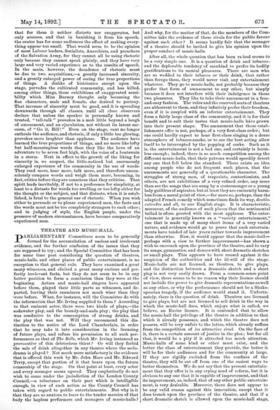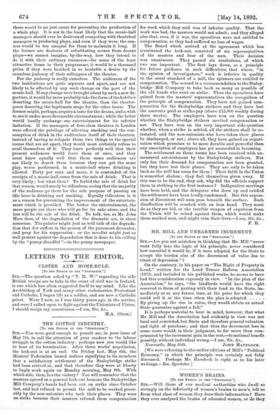THEATRE AND MUSIC-HALL.
PARLIAMENTARY Committees seem to be generally formed for the accumulation of useless and irrelevant evidence, and the further confusion of the issues that they are supposed to try; and the Special Committee that has been for some time past considering the question of theatres, music-halls, and other places of public entertainment, is no exception to that general rule. They have examined a great ssany witnesses, and elicited a great many curious and per- fectly irrelevant facts, but they do not seem to be in any better position to form a conclusion than they were at the beginning. Actors and music-hall singers have appeared before them, played their little parts as witnesses, and de- parted, leaving their examiners not much wiser than they were before. What, for instance, will the Committee do with the information that Mr. Irving supplied to them ? According to that eminent actor, there were two kinds of plays,—the sodawater play, and the brandy-and-soda play; the play that was conducive to the consumption of strong drinks, and the play that was not. Will they recommend this dis- tinction to the notice of the Lord Chamberlain, in order that he may take it into consideration in the licensing of future plays, and refuse his permission to all such per- formances as that of The Bells, which Mr. Irving instanced as provocative of this deleterious thirst ? Or will they forbid the sale of drink altogether in any theatre where the melo- drama is played ? Not much more satisfactory is the evidence that is offered this week by Mr. John Hare and Mr. Edward Terry, except that portion of it that bears upon the future censorship of the stage. On that point at least, every actor and every manager seems agreed. They emphatically do not wish to come under the jurisdiction of the London County Council,—a reluctance on their part which is intelligible enough, in view of such action as the County Council has taken with regard to public entertainments. But why is it that they are so anxious to leave to the tender mercies of that body the hapless performers and managers of music-halls P
And why, for the matter of that, do the members of the Com- mittee take the evidence of these rivals for the public favour against each other ? It seems hardly fair that the manager of a theatre should be invited to give his opinion upon the proper conduct of music-halls.
After all, the whole question that has been raised seems to be a very simple one. It is a question of drink and tobacco, and the deplorable tendency of mankind to prefer its bodily gratifications to its mental pleasures. There are men who are so wedded to their tobacco or their drink, that rather than forego them, they would never visit any entertainment whatever. They go to music-halls, not probably because they prefer that form of amusement to any other, but simply because it does not interfere with their indulgence in those two pleasures. They like to take their amusement in a free- and-easy fashion. The rules and the reserved seats of theatres are abhorrent to them, and they infinitely prefer their freedom, even if it is coupled with an inferior entertainment. They form a fairly large class of the community, and it is for their benefit and to suit their tastes that music-halls hive grown into their present shape. The amusement that these estab- lishments offer is not, perhaps, of a very first-class order; but one could hardly expect to hear first-class singing in a dense atmosphere of tobacco-smoke, or to see the beat acting allow itself to be interrupted by the popping of corks. Such as it is, the entertainment is not a bad one, and certainly is harm- less enough; indeed, there is so much competition among the different music-halls, that their patrons would speedily desert any one that fell below the standard. There exists an idea among people who do not frequent such places, that the amusements are generally of a questionable character. The struggles of strong men, of trapezists, contortionists, and others, are not exhibitions of a very refined order, any more than are the songs that are sung by a costermonger or a young lady guiltless of aspirates, but at least they are eminently harm-
less from a moral point of view,—far more so, perhaps, than the adapted French comedy which sometimes finds its way, double- entendre and all, to our English stage. It is characteristic,
moreover, of the audience of such places that the sentimental ballad is often greeted with the most applause. The enter- tainment is generally known as a "variety entertainment," one that is made up of many short items of a very varied nature, and evidence would go to prove that such entertain- ments have tended of late years rather towards improvement than otherwise. Now, it would appear that the music-hall- perhaps with a view to further improvement—has shown a wish to encroach upon the province of the theatre, and to vary its songs, gymnastics, and dances with short dramatic sketches or small plays. This appears to have roused against it the suspicion of the authorities and the ill-will of the stage. Music-halls are not licensed, as theatres, to give plays, and the distinction between a dramatic sketch and a short play is not very easily drawn. From a common-sense point of view, there seems to be no reason why their licence should not include the power to give dramatic representations as well as any other, or why the performance should not be a Shake- spearian tragedy, if the audience would stand it. Unfortu- nately, there is the question of drink. Theatres are licensed to give plays, but are not licensed to sell drink in the way in which the music-hall does, which enjoys what is called, we believe, an Excise licence. It is contended that to allow the music-hall the privilege of the theatre in addition to that which it already possesses, and which the theatre does not possess, will be very unfair to the latter, which already suffers from the competition of its attractive rival. On the face of it, there is a certain amount of justice in the plea ; but for all that, it would be a pity if it attracted too much attention. Music-halls of some kind or other must exist, and the better the class of entertainment they provide, the better it will be for their audiences and for the community at large. If they are rigidly excluded from the confines of the theatre, they will be cut off from one of the easiest ways to better themselves. We do not say that the present entertain- ment that they offer is in any crying need of reform, but it is obvious to any one that it is capable of improvement, and that its improvement, as, indeed, that of any other public entertain- ment, is very desirable. Moreover, there does not appear to be any valid reason against this innovation, except that it does trench upon the province of the theatre, and that if a short dramatic sketch is allowed upon the music-hall stage, there would be no just cause for preventing the production of a whole play. It is not in the least likely that the music-hall managers should ever be desirous of competing with theatrical managers in producing plays, and even if they were, the con- test would be too unequal for them to maintain it long. If the former are desirous of substituting scenes from decent plays—we cannot imagine, by-the-way, how they intend to do it with their ordinary resources—for some of the least attractive items in their programme, it would be a thousand pities if they were baulked in so laudable a desire by the causeless jealousy of their colleagues of the theatre.
For the jealousy is really causeless. The audiences of the two institutions are quite separate and apart, and are not likely to be affected by any such change on the part of the music-hall. If any change were brought about by such a new de- parture, it would far more probably take the form of the hatitujs deserting the music-hall for the theatre, than the theatre- goers deserting the legitimate stage for the other house. The former might, perhaps, acquire a taste for the drama, and a wish to see it under more favourable circumstances ; while the latter would hardly exchange one entertainment for its inferior imitation. If the managers of first-class theatres in London were offered the privilege of allowing smoking and the con- sumption of drink in the auditorium itself of their theatres, instead of having to relegate those two things to the special rooms that are set apart, they would most certainly refuse to avail themselves of it. They know perfectly well that their present audiences would leave them at once, and they must know equally well that these same audiences are not likely to desert them because they can get the same play, worse performed, in a music-hall where drinking is allowed. Forty per cent. and more, it is contended, of the receipts of a music-hall come from the sale of drink. That is very likely ; but what then ? To forbid the sale of drink for that reason, would surely be ridiculous, seeing that the majority of the audience go there for the sole purpose of passing an idle hour in drinking and smoking. Equally ridiculous is it as a reason for preventing the improvement of the entertain- ment which is provided. The better the entertainment, the more people are there who will go for its sake alone, and the less will be the sale of the drink. To talk, too, as Mr. John Hare does, of the degradation of the dramatic art, is sheer nonsense. The painter might just as well talk of the degrada- tion that Art suffers in the person of the pavement-decorator, and pray for his suppression : or the novelist might just as well protest against the degradation that is done to his calling by the "penny-dreadful "—in the penny newspaper.







































 Previous page
Previous page